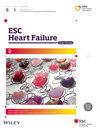Analysis of the usefulness and benefits of ultrafiltration in cardiorenal syndrome: A systematic review
Abstract
Aims
Cardiac decompensation in cardiorenal syndrome (CRS) results in systemic congestion usually treated with diuretics. When despite high doses of diuretics, response is poor, ultrafiltration (UF) appears to be a useful and safe technique. The aim of the study was to analyse, by means of a systematic review, the efficacy and safety of UF versus conventional diuretic treatment.
Methods and results
Search of the main databases (Pubmed, Embase and Cochrane Central Register of Controlled Trials) identifying comparative studies of UF versus diuretic therapy, from 2000 to the present. After screening the studies, 13 studies were analysed; 1100 patients (UF: 532, diuretic treatment: 568). Renal function: UF showed a trend to lower creatinine at discharge (SME = −0.68; 95% CI −1.50 to 0.13; I2 = 97%) with no difference in glomerular filtration rate (SME = 0.05; 95% CI −0.17 to 0.27; I2 = 0%). Diuretic response: With UF, there was a trend towards greater weight loss (SME = 1.82; 95% CI −0.79 to 4.42; I2 = 99.7%) and greater volume removed (SME = 3.04; 95% CI −2.13 to 8.20; I2 = 99.8%). Morbidity and mortality: No difference in days of hospital stay (LogOR = −0.14; 95% CI −0.52 to 0.23; I2 = 66.9%) and mortality at 1 month (LogOR = −0.04; 95% CI −0.34 to 0.44; I2 = 0%) but reduction in readmissions in patients with UF (LogOR = −0.60; 95% CI −0.94 to −0.26; I2 = 40.5%).
Conclusions
In decompensated HF and CRS with inadequate diuretic response, UF versus diuretic intensification is an effective and safe option; it reduces readmissions with a tendency to decrease weight, creatinine levels and increase volume depletion without affecting mortality. Prospective randomised studies with a sufficient number of patients are needed to corroborate these results.


 求助内容:
求助内容: 应助结果提醒方式:
应助结果提醒方式:


